- Home
- Louis Sachar
The Cardturner
The Cardturner Read online
THE
CARDTURNER
ALSO BY Louis Sachar
Holes
Small Steps
Stanley Yelnats' Survival Guide to Camp Green Lake
Dogs Don't Tell Jokes
The Boy Who Lost His Face
There's a Boy in the Girls' Bathroom
Bloomsbury Publishing, London, Berlin and New York
First published in Great Britain in June 2010 by Bloomsbury Publishing Plc
36 Soho Square, London, W1D 3QY
First published in the USA in May 2010 by Delacorte Press, an imprint of Random House Children’s Books, a division of Random House Inc., New York
This electronic edition published in June 2010 by Bloomsbury Publishing Plc
Text copyright © Louis Sachar 2010
The moral rights of the author have been asserted
The publishers are grateful to the following for permission to reproduce copyright material:
Lines from Cannery Row by John Steinbeck – Penguin Modern Classics New Edition, ed. Susan Shillingford, published in Great Britain in 2000 by Penguin Books, page 107 lines 7-11, copyright 1945 by John Steinbeck. Reproduced by permission of Penguin Books Ltd.
Bye Bye Blackbird – Words by Mort Dixon/Music by Ray Henderson – © 1926 (Renewed) Ray Henderson Music Corp., Old Clover Leaf Music, Redwood Music Ltd. – All Rights Reserved – International Copyright Secured – Lyric reproduction by kind permission of Redwood Music Ltd.
Bye Bye Blackbird – Words and music by Ray Henderson and Mort Dixon © 1926, reproduced by permission of EMI Music Publishing Ltd, London W8 5SW
Bye Bye Blackbird – Words and music by Ray Henderson and Mort Dixon © 1926, reproduced by permission of Warner/Chappell Music Ltd, London W8 4EP
All rights reserved
You may not copy, distribute, transmit, reproduce or otherwise make available this publication (or any part of it) in any form, or by any means (including without limitation electronic, digital, optical, mechanical, photocopying, printing, recording or otherwise), without the prior written permission of the publisher. Any person who does any unauthorised act in relation to this publication may be liable to criminal prosecution and civil claims for damages
A CIP catalogue record of this book is available from the British Library
ISBN 978 1 4088 1243 3
www.bloomsbury.com
www.louissachar.co.uk
Visit www.bloomsbury.com to find out more about our authors and their books You will find extracts, author interviews, author events and you can sign up for newsletters to be the first to hear about our latest releases and special offers
To Nancy Joe, Nancy Jo Gordy, Marilou Powell, Paul and Beth Tobias,
Jerry Bigler, Claudette Hartman, Alex Kolesnik, and Ruth Sachar.
It's been a joy sitting across the table from you
(even if a bit trying at times),
and to all my friends at the Austin Bridge Center,
opponents and partners alike,
and to anyone, anywhere, who is struggling to figure out
whether a bid of four clubs is Gerber or natural . . .
Table of Contents
A Note from the Author
1 My Favorite Uncle
2 A Turn for the Worse
3 By the Way
4 And, And, And . . .
5 Cliff
6 Are You Sure?
7 Teodora
8 The Club
9 Shuffle and Play
10 An Apology of a Sort
11 Tiger Woods's Caddy
12 The Basics
13 In the Garbage
14 National Championship
15 The Perfect Partner
16 The Milkman and the Senator's Wife
17 Finesse
18 The Housing Crisis
19 Captain and the Radio
20 Toni Castaneda
21 Fixed
22 The Blind Lady Bowler
23 Bidding
24 My Sick Fantasy
25 Lab Rats Pushing Buttons
26 Yarborough
27 A Phone Call
28 Toni's Grandmother and President Nixon
29 A Silver Ice Bucket
30 The Life of the Party
31 Smoking Ears
32 A Singing Pig
33 The Great Bridge Detective
34 Director, Please!
35 Toni and Cliff
36 Synchronicity
37 Trapp's Closest Living Relatives
38 Thank You, Partner
39 Two Idiots at Table Seven
40 The Subconscious Mind
41 Entourage
42 Annabel and Ike
43 IMPs
44 The Milkman's Clothes
45 Thugs in Business Suits
46 Nixon
47 Teodora's Tea
48 Quack of Clubs
49 A Monkey and a Typewriter
50 Ducking Smoothly
51 A Very Scared Little Girl
52 Deborah in the Closet
53 A Fresh Start
54 Transfer Bids
55 Post-mortem
56 Welcome to My World
57 Ninety-three, Ninety-one
58 In the Pantry
59 Looking at Colleges
60 Not a Wet Sock
61 They Need Us
62 Twenty-five Percent Slam
63 A Long Hesitation
64 The First Hand
65 The Donkey Hand
66 The Beer Card
67 A Message from Afar
68 Signals
69 Q
70 Canned Peas
71 Transportation
72 The Final Session
73 The Final Table
74 The Final Hand
75 Talk About Wow
76 Philosophically Bent
APPENDIX
About the Author
A Note from the Author
Imagine you were abducted by aliens and taken away to their home planet. After living there awhile, you learn to speak their language, and then actually become a pretty well-known author. You were a huge baseball fan back on Earth, so you decide to write a book about baseball. You know that none of your alien readers have ever heard of baseball, but you think it will make a great story, and besides, you really love the game. . . .
As you attempt to write it, you quickly find yourself entangled in words with multiple meanings, like ball and run. When you try to describe a triple play, you get so bogged down explaining the rules about force-outs that the excitement of the play itself is lost.
That was the predicament I put myself into when I wrote The Cardturner. It's not about baseball but about bridge, a card game that was once extremely popular but that, unfortunately, not too many people play anymore, especially not young people. In fact, the people who do play bridge seem to live in their own alien world.
My publisher, my editor, my wife, and my agent all said I was crazy. "No one's going to want to read a book about bridge!" they told me on more than one occasion.
Still, I really love the game. . . .
THE
CARDTURNER
1
My Favorite Uncle
Ever since I was a little kid, I've had it drilled into me that my uncle Lester was my favorite uncle. My mother would thrust the phone at me and say, "Uncle Lester wants to talk to you," her voice infused with the same forced enthusiasm she used to describe the deliciousness of canned peas. "Tell him you love him."
"I love you, Uncle Lester," I'd say.
"Tell him he's your favorite uncle."
"You're my favorite uncle."
It got worse as I got older. I never knew what to say to him, and he never seemed all that interested in talking to m
e. When I became a teenager I felt silly telling him he was my favorite uncle, although my mother still urged me to do so. I'd say things like "Hey, how's it goin'?" and he'd grunt some response. He might ask me a question about school. I imagine it was a great relief to both of us when my mother took back the phone. Our brief conversations always left me feeling embarrassed, and just a little bit creepy.
He was actually my great-uncle, having been my mother's favorite uncle long before he was mine.
I didn't know how much money he had, but he was rich enough that he never had to be nice to anyone. Our favorite uncle never visited us, and I think my mother initiated all the phone conversations with him. Later, after he got really sick, he wouldn't even talk to her. My mother would call almost daily, but she could never get past his housekeeper.
I had only met Uncle Lester face to face one time, at his sixty-fifth birthday party. I was six years old, and to me, his house seemed like a castle on a mountaintop. I said the obligatory "Happy birthday" and "I love you" and "You're my favorite uncle" and then steered clear of him.
"His heart is as cold as a brick," my father said on the drive home.
That phrase has stuck with me, I think, because my father used the word cold instead of hard.
My elementary school was a brick building. Every day on the way home, I would drag my fingers over the hard, and yes, cold surface.
I'm in high school now, but still whenever I walk by a brick building, I feel compelled to touch it. Even now, as I write this, I can almost feel the hard coolness, the sharp edges, and the roughness of the cement between the bricks.
2
A Turn for the Worse
Uncle Lester has taken "a turn for the worse." That's a phrase I heard a lot around the first of this year. Another phrase that came up a lot was "complications resulting from diabetes."
I wish I could report that these words brought great concern and sadness to our household. True, when my mother spoke of our favorite uncle's unfortunate turn, her voice had a somber tone, and sometimes she would place a hand on her heart, but I would say the overall mood was one of anxious anticipation. Once, I actually saw my father rub his hands together when he mentioned that Uncle Lester was not long for this world. December 25 might have come and gone, but there was a sense that Christmas was still just around the corner.
To be fair, I should mention that my father worked for a company that manufactured and installed insulation material. He often complained how the synthetic fibers made his hands itch, and that could have been the reason he was rubbing his hands together.
Nevertheless, the only person who seemed genuinely worried about our favorite uncle was my sister, Leslie. She was also the only one of us who had never met him, unless you count his sixty-fifth birthday party. She was about four months old when we went to his dark castle on the mountain. My mother put extra emphasis on the first syllable of my sister's name when she introduced Uncle Lester to his new grandniece, Leslie.
Leslie was eleven when Uncle Lester took his turn for the worse.
"What's diabetes?" she asked me.
"It's kind of a disease," I answered. "It has something to do with your body not being able to turn sugar into insulin."
"Why do you need insulin?"
I didn't know.
"Is Uncle Lester in pain?"
Complications-resulting-from-diabetes was just a string of words to me, and I never gave much thought to their meaning. Unlike me, Leslie could feel the suffering behind the words.
A week later I found out just how complicated his condition was. My uncle Lester had become blind.
"I guess he won't be playing cards anymore," my father said, rather callously, I thought.
It was the first time I'd ever heard anything about my uncle and cards.
According to my mother, we were Uncle Lester's closest living relatives. By this, I think she meant we lived the closest, which I doubted had any legal significance, but she seemed to think this was important if, God forbid, anything should happen to him.
He had no children of his own. He had one brother and two sisters, and they all had children (including my mother), and their children had children (including Leslie and me).
That was a lot of people with whom to split any inheritance, but my mother seemed especially concerned about Mrs. Mahoney, Uncle Lester's longtime housekeeper. "I think there's more going on there than just housekeeping, if you know what I mean," she said one evening during dinner.
She was speaking somewhat cryptically because of Leslie. I knew what she meant, of course, and I'm pretty sure Leslie did too, but I really didn't want to think about my old uncle and his aging housekeeper while I was eating.
There was somebody else who was even more worrisome to my mother than Mrs. Mahoney. That person was Sophie Castaneda.
I'd heard about the Castaneda family all my life, "the crazy Castanedas," but I never quite got my uncle's relationship to them. It was complicated, to say the least.
From what I understood, Sophie Castaneda was the daughter of Uncle Lester's ex-wife's crazy sister.
When Uncle Lester was in his twenties, he had been married for less than a year. His wife had a sister who went insane. The sister had a daughter named Sophie King, who later changed her name to Sophie Finnick, and then became Sophie Castaneda when she got married.
See what I mean?
According to my mother, all the Castanedas were bonkers. I met Toni Castaneda, Sophie's daughter, at my uncle's sixty-fifth birthday. Toni was about six years old, and I remember I was glad to find someone my own age to play with. Toni ran up to me. She covered her ears with her hands, her elbows sticking out, and shouted, "Shut up! Leave me alone!" and then she ran away.
She didn't do that just to me. I watched her tell other people to shut up and leave her alone too. I thought she was funny, but when I tried playing that game, I got in trouble for saying shut up.
3
By the Way
This is very embarrassing.
Have you ever been in a situation where you've been with someone for a while and you don't know that person's name? It's too late to ask, but you know the longer you go without asking, the more awkward it will become. So even though you feel really stupid, you finally just have to bite the bullet and say, "By the way, what's your name?"
That's how I'm feeling right now, only in reverse.
By the way, my name is Alton Richards.
A talented author would have skillfully slipped that in earlier, probably on the very first page. "Alton, come tell your favorite uncle how much you love him." Something like that.
Part of my difficulty, you have to admit, is my name. If I tried to slip Alton into the conversation, you might not have recognized it as a name. You might have wondered, "What does that word mean?"
And if I tried to slip in my last name, chances are you would have thought my name was Richard Alton. A number of teachers have called me that.
I'm seventeen years old. I am five feet, ten and a half inches tall, and I weigh 150 pounds. My hair is brown, and more fluffy than curly. I have dark, "intuitive" eyes and a "warm" smile.
My ex-girlfriend, Katie, is the one who described my eyes as intuitive and said my smile was warm. That was before she dumped me. Afterward she probably would have said I had a pathetic stare and a goofy smile, but since I'm the one writing this, we'll stick with intuitive and warm.
I asked Katie what she meant by "intuitive eyes." She said I could see right through all her phoniness and I always knew exactly what was in her heart.
The truth is, I never had a clue.
Maybe that's why I fell in love with her. People are attracted to mystery. No doubt I once seemed mysterious too, but by the time we broke up, I was to her, just as I am to you, an open book.
4
And, And, And . . .
By mid-March Uncle Lester's health had taken another turn, whether for the better or worse depends on your point of view. Sophie Castaneda had installed some kin
d of New Age nurse in my uncle's household. This nurse, Teodora, put him on a vegetarian diet and had him doing yoga and meditation.
"She's just prolonging his suffering," my mother said, and maybe she really believed that.
Mrs. Mahoney didn't like the new nurse either, and complained to my mother that Teodora paraded around the house half naked.
"Which half?" I asked.
My mother ignored my question. "When Mrs. Mahoney suggested to her that she might want to dress more appropriately, do you know what Teodora said? ‘What does it matter? He can't see me.' "
"What does it matter?" asked Leslie.
"It's disgusting, that's what" was our mother's reply.
I mentioned earlier that my mother didn't trust Mrs. Mahoney, but you wouldn't know that from listening to her end of one of their daily telephone conversations. She'd chat and laugh and say things like "Isn't that just like a man?"
Mrs. Mahoney was her only source of information. It wasn't until after my mother hung up that the smile would leave her face. Then she'd wonder out loud if Mrs. Mahoney told Uncle Lester how many times she had called, or if Mrs. Mahoney had relayed even one of her dinner invitations.
My father was wrong when he said that Uncle Lester would never play cards again.
"He's been playing cards four days a week with Toni Castaneda," my mother informed us one evening, her voice stewed in bitterness.
I didn't see how that was possible.
"What can they play?" Leslie asked me later in my room. "Go Fish? 'Do you have any sevens?' Then what? Toni looks at his cards to see if he has any sevens. She could cheat like so easily!"
"Why would she cheat an old blind man who's about to die?" I asked. "It's probably just the opposite. He asks her if she has any sevens, and she says, ‘Darn it, you got me again,' and hands him a six and a king."
"And then he changes his will and leaves her all his money," said Leslie.
Leslie had come into my room for the computer, but I was still using it. I had priority, not just because I was older and the computer was in my room, but because I usually waited until the last minute to do my homework, and so I had a greater urgency. Leslie did her homework the day it was assigned, and therefore could wait.

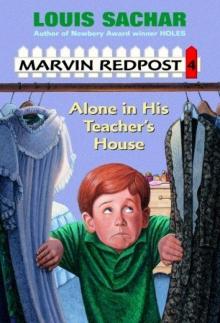 Alone in His Teacher's House
Alone in His Teacher's House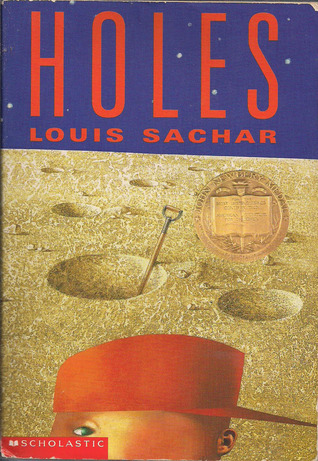 Holes
Holes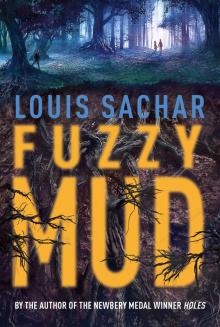 Fuzzy Mud
Fuzzy Mud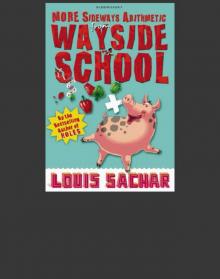 More Sideways Arithmetic From Wayside School
More Sideways Arithmetic From Wayside School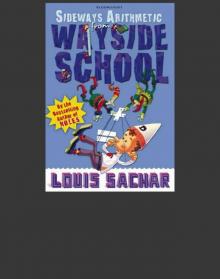 Sideways Arithmetic From Wayside School
Sideways Arithmetic From Wayside School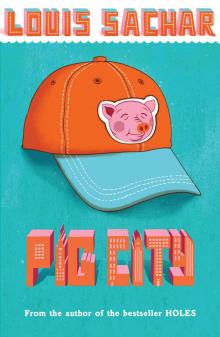 Pig City
Pig City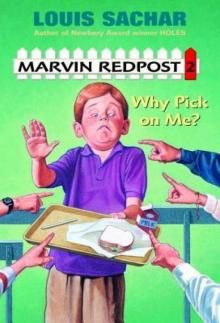 Why Pick on Me?
Why Pick on Me? The Boy Who Lost His Face
The Boy Who Lost His Face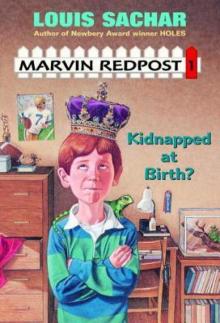 Kidnapped at Birth?
Kidnapped at Birth?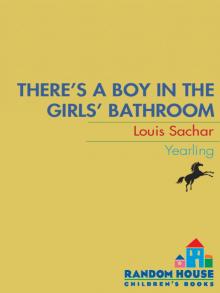 There's a Boy in the Girls' Bathroom
There's a Boy in the Girls' Bathroom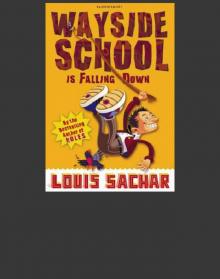 Wayside School Is Falling Down
Wayside School Is Falling Down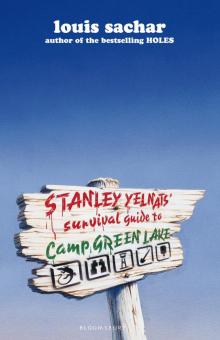 Stanley Yelnats' Survival Guide to Camp Green Lake
Stanley Yelnats' Survival Guide to Camp Green Lake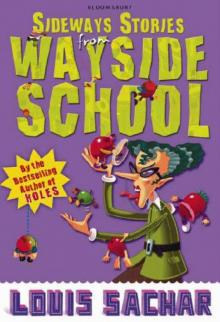 Sideways Stories from Wayside School
Sideways Stories from Wayside School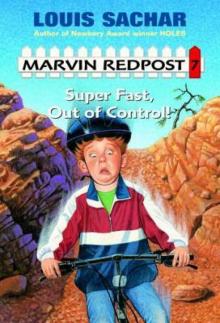 Super Fast, Out of Control!
Super Fast, Out of Control!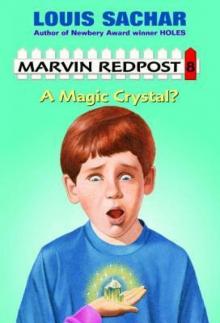 A Magic Crystal?
A Magic Crystal?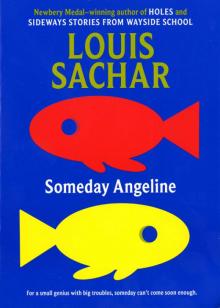 Someday Angeline
Someday Angeline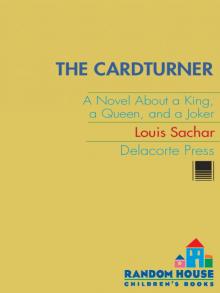 The Cardturner: A Novel About Imperfect Partners and Infinite Possibilities
The Cardturner: A Novel About Imperfect Partners and Infinite Possibilities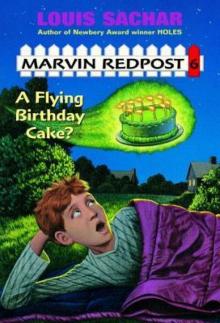 A Flying Birthday Cake?
A Flying Birthday Cake?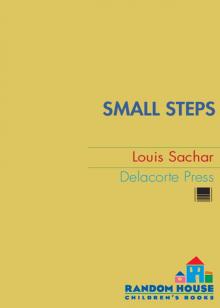 Small Steps
Small Steps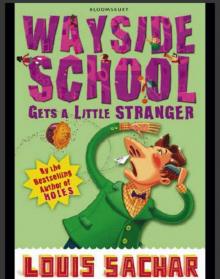 Wayside School Gets a Little Stranger
Wayside School Gets a Little Stranger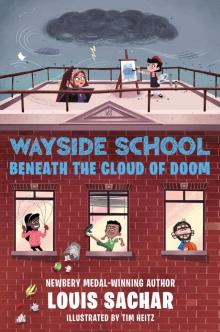 Wayside School Beneath the Cloud of Doom
Wayside School Beneath the Cloud of Doom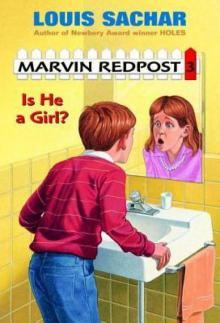 Is He a Girl?
Is He a Girl? Dogs Don't Tell Jokes
Dogs Don't Tell Jokes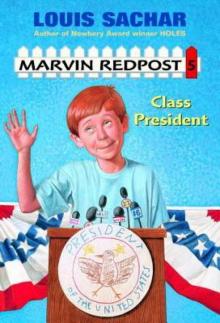 Class President
Class President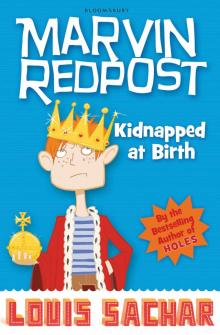 Kidnapped at Birth
Kidnapped at Birth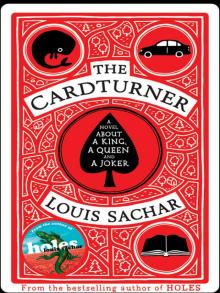 The Cardturner
The Cardturner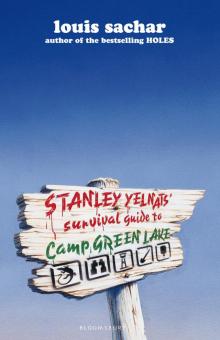 Stanley Yelnats' Survival Guide to Camp Greenlake
Stanley Yelnats' Survival Guide to Camp Greenlake